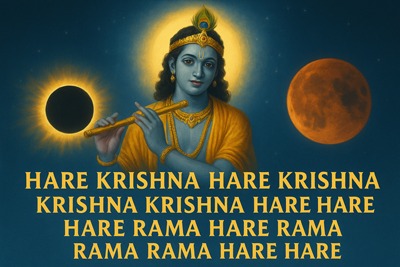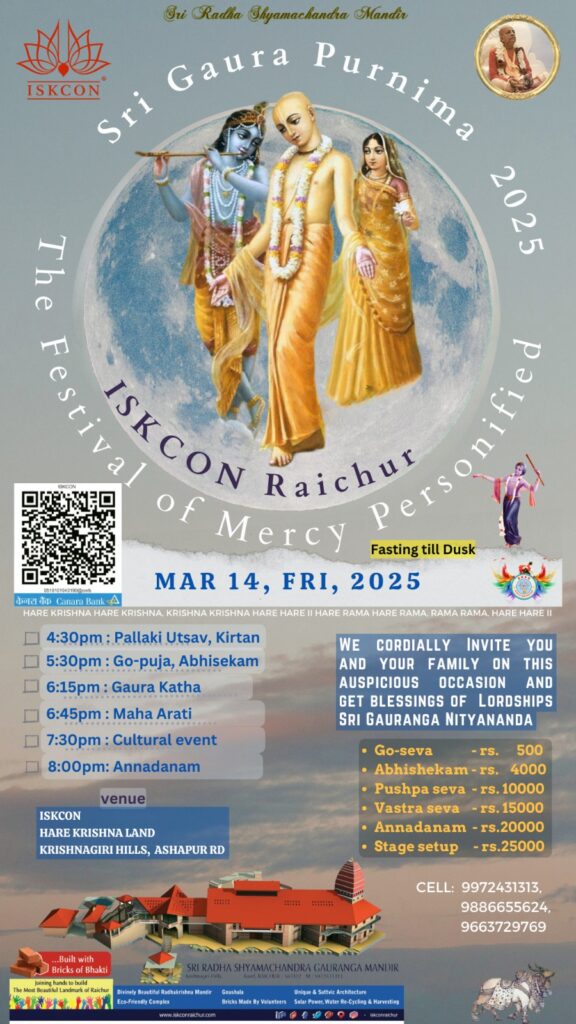
In the Vedic worldview, eclipses (both solar and lunar) are not just astronomical events but also deeply spiritual and cosmological. Let me explain from both perspectives:
1. Cosmological / Puranic Explanation
According to the Purāṇas, eclipses are caused by Rāhu and Ketu, who are not planets in the modern sense but chāyā-grahas (shadow planets).
Story:
In the Samudra-manthana (churning of the ocean), a demon named Swarbhānu disguised himself among the devas to drink the nectar of immortality. Lord Viṣṇu, as Mohinī-mūrti, cut off his head with His Sudarśana Chakra.
- The head became Rāhu, and the body became Ketu.
- Since then, Rāhu tries to swallow the Sun (Sūrya) and Moon (Candra) out of revenge, causing eclipses. However, as he has no body, they reappear again.
Thus, eclipses are seen as moments when demonic forces temporarily attack divine luminaries.
2. Astronomical Understanding in Jyotiṣa
Jyotiṣa-śāstra (Vedic astrology) also acknowledges the astronomical fact of alignments (Sun, Moon, Earth).
- Rāhu and Ketu correspond to the lunar nodes (intersection points of the Moon’s orbit and the ecliptic).
- That is why eclipses occur when the Sun and Moon are near these nodes.
3. Scriptural Instructions During Eclipses
The Dharma-śāstras (Manu-smṛti, Yājñavalkya-smṛti, and others) give practical do’s and don’ts during eclipses:
Auspicious for Spiritual Activity
Eclipses are considered very powerful times for japa, dāna, and snāna (chanting, charity, and bathing).
Results obtained from spiritual practice multiply manifold.
Bathing (Snāna)
A ritual bath is recommended at the beginning and end of an eclipse, preferably in a river or sacred water.
Fasting
Eating is discouraged during an eclipse. One should fast before it begins and eat only after bathing when it ends.
Śuddhi (Purification)
- Food cooked before an eclipse is often considered impure (except raw grains, fruits, etc.).
- Many households cover food and water to protect them.
Deity Worship
- Temple doors are traditionally closed during an eclipse.
- Worship resumes after purification.
- Devotees chant mantras, especially Hare Kṛṣṇa Mahāmantra, Viṣṇu Sahasranāma, or Gāyatrī mantra.
4. Spiritual Significance
Symbolically, eclipses remind us that material light can be obscured by illusion (Rāhu), but divine truth always reemerges.
It’s seen as a reminder of the temporary covering of māyā and the eternal triumph of divine light.
Vaiṣṇava ācāryas recommend spending eclipse time exclusively in Hari-bhajana (remembrance of Kṛṣṇa).
ISKCON’s View
ISKCON’s view on eclipses is rooted in the Śrīmad-Bhāgavatam, Purāṇas, and Gauḍīya Vaiṣṇava tradition.
It aligns with the Vedic understanding but emphasizes bhakti practice over ritualism.
- Gauḍīyas highlight that Mahāprabhu appeared during an eclipse so that everyone would chant Hare Kṛṣṇa, making it the most auspicious of all eclipses.
- Therefore, ISKCON devotees see every eclipse as a reminder of that divine event and as a chance to imitate the residents of Navadvīpa by loudly chanting.
Śrīla Prabhupāda’s Approach
Śrīla Prabhupāda neither altered his own schedule nor made any adjustments to the schedule of Deity service in ISKCON centers during eclipses.
His personal activities—waking, translating, receiving massage, bathing, walking, honoring prasādam, and resting—continued without interruption before, during, and after eclipses.
Likewise, ISKCON temples were not closed during those times.
Testimonies from Disciples
Śrutakīrti Prabhu (Personal Servant)
“I was with Prabhupāda throughout 1973, and part of 1974 and 1975. During that period, there were at least six eclipses. No special arrangements were made with regard to cooking, massage, or any other part of my service. Śrīla Prabhupāda was always very steady and regulated in his daily routine.”
His Holiness Nirañjana Swāmī
“It was business as usual within our temples during Prabhupāda’s time on this planet. Any changes we see now in eclipse observances have appeared after his departure—most likely due to local pressures to conform to tradition. This is a mistake. If stopping Deity services during an eclipse was truly important, Śrīla Prabhupāda would have instructed us. But in those 11 years, he never once asked us to suspend or interrupt the service of the Deities.”
Bhaktisiddhānta Sarasvatī Ṭhākura’s Instruction
“The duties of a practitioner are regulative devotional service during an eclipse.
According to smārta opinion, the period of an eclipse is considered inauspicious, and therefore they abstain from activities normally avoided in times of impurity. But devotees engaged in regulative devotional service should, as far as possible, continue serving the Supreme Lord as usual, without being bound by such mundane considerations.”
(Sri Gaudīya Maṭha, Calcutta, September 27, 1922)
Śrīla Prabhupāda’s Response
- When Dr. Patel asked about stopping or suspending Deity worship during an eclipse, Śrīla Prabhupāda expressed surprise: “Why?”
- Even when Dr. Patel pointed out that other Vaiṣṇava temples followed such practices, Prabhupāda dismissed the idea with a simple: “Hare Kṛṣṇa.”
(Morning Walk, November 17, 1975)
In a 1974 letter to Amsu Dāsa from Vṛndāvana, Śrīla Prabhupāda clearly affirmed:
“One thing is that the seva can never be stopped for any reason. This also for the cooking.”
(Letter, August 13, 1974)
✅ Summary – ISKCON View from Prabhupāda’s Teachings
- Śāstra explains eclipses as Rāhu’s attack.
- Traditional rules exist (bathing, fasting, discarding food).
- Prabhupāda did not mandate devotees to follow those procedures.
His emphasis:
- Chant Hare Kṛṣṇa during eclipse.
- Remember Caitanya Mahāprabhu’s divine appearance.
- Take it as a special chance for saṅkīrtana, not ritual rigidity.


